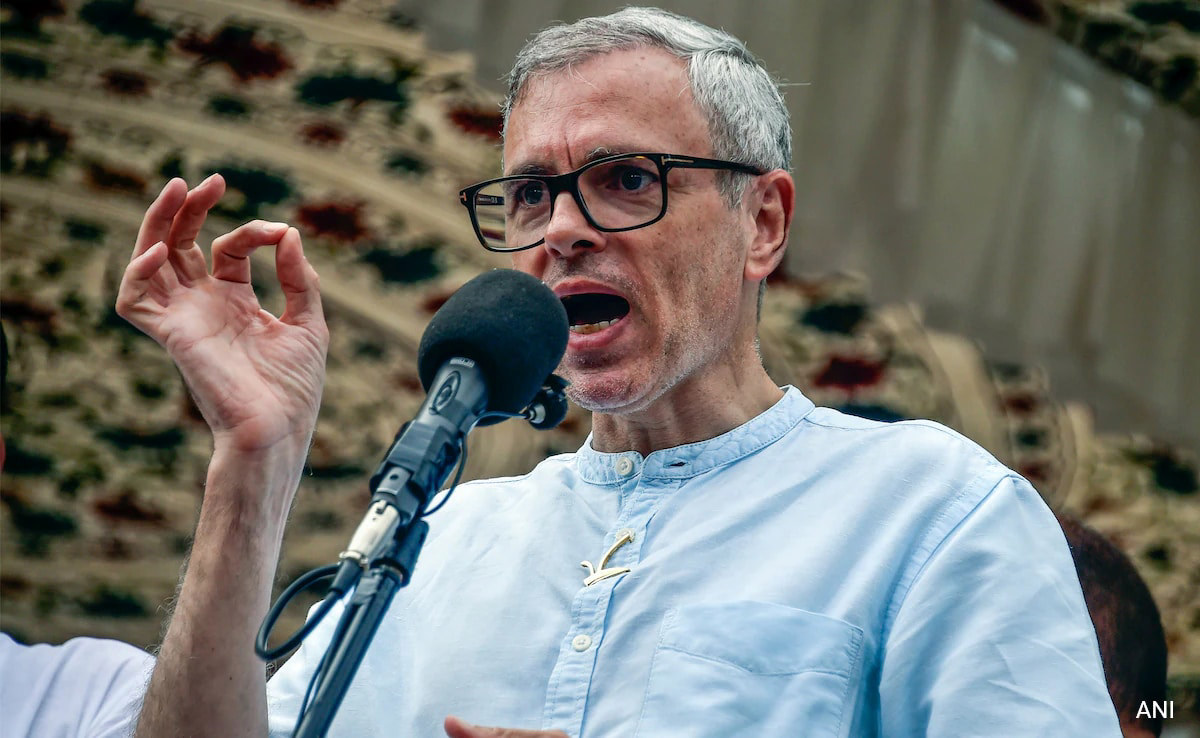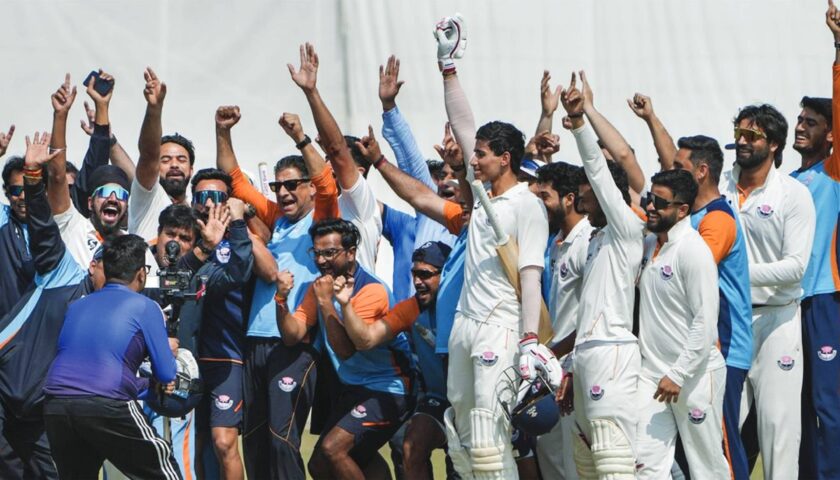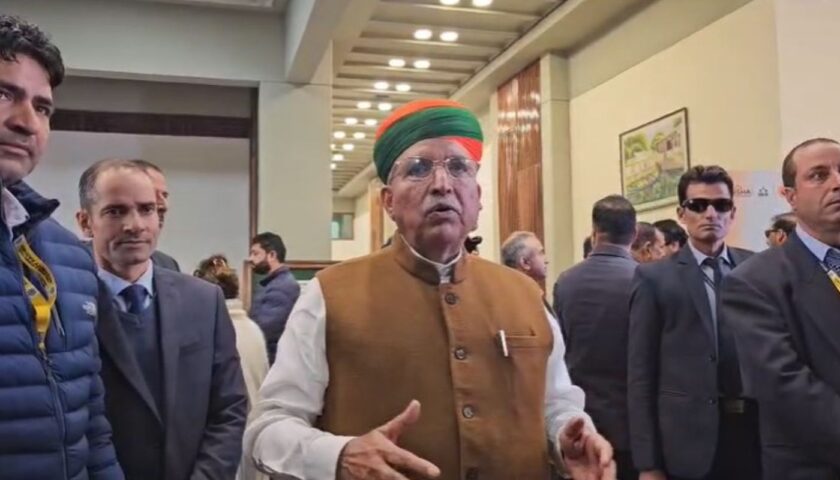NC Chief Speaks After Losing Fourth Rajya Sabha Seat to BJP
By: Javid Amin | 24 October 2025
Victory and Setback: The Mixed Verdict
After the National Conference (NC) clinched three of four Rajya Sabha seats from Jammu and Kashmir, party vice president Omar Abdullah addressed the media with a blend of gratitude and frustration.
While celebrating the NC’s sweeping win on three seats, he described the loss of the fourth seat to BJP’s Sat Paul Sharma as “deeply disappointing,” especially since the BJP polled 32 votes despite having only 28 MLAs.
Omar’s carefully measured remarks reflected both political maturity and underlying anger over what he called “betrayal at the final stage.”
“I’m grateful to all those who stood firm with us. I’m disappointed by a few who broke their word when it mattered most. It’s not appropriate to name them, but they know who they are.”
— Omar Abdullah, post-election press interaction.
“No Cross-Voting Within NC”
Responding to speculation about dissent within his own ranks, Omar Abdullah categorically denied any cross-voting by NC legislators, asserting that all NC votes remained intact and were verified by official polling agents.
“Our agents confirmed that every National Conference MLA voted as per the whip. The problem did not come from us. It came from outside — from those who made commitments to us and then went back on their word,”
— Omar Abdullah.
His statement was aimed at dismissing BJP claims that internal rifts within the NC contributed to the result. Instead, Omar framed the outcome as a breach of trust by non-NC allies, a clear reference to disenchanted members from Congress, PDP, or Independent blocs.
Allegations of Deliberate Invalid Votes
In a revealing comment, Omar hinted that some MLAs may have deliberately invalidated their ballots by marking incorrect preferences — a subtle form of sabotage that ultimately benefited the BJP.
“There are indications that a few votes were intentionally spoiled — either by design or instruction. Those responsible must put their hands up and own up to helping the BJP,”
— Omar Abdullah.
Election Commission officials confirmed that a small number of ballots were deemed invalid during counting, though the identities of those involved were not disclosed.
This adds a new dimension to the controversy, suggesting that the BJP’s victory may not have stemmed from overt cross-voting alone, but from calculated abstentions and technical manipulation.
Behind the Numbers
The NC, supported by 41 MLAs, six Independents, seven Congress members, and two PDP legislators, appeared well-positioned to sweep all four seats.
However, BJP candidate Sat Paul Sharma won with 32 votes, a result that shocked both NC and Congress ranks.
The BJP’s official strength in the Assembly is 28 MLAs, meaning four extra votes came from outside the saffron camp.
While Congress and PDP leaders initially denied cross-voting, insiders admit that two legislators abstained and at least one vote may have been invalidated, effectively tipping the balance.
This numerical puzzle has now turned into a political blame game, with each party trying to contain reputational damage before the 2026 Assembly elections.
🤝 Alliance Strains Resurface
The NC’s post-result tone underscores the fragile nature of its alliance with Congress and PDP.
Just weeks before the election, the Congress skipped a joint strategy meeting called by the NC, and the PDP limited its support to three seats while withholding it for the fourth — the same one that went to BJP.
While Omar avoided naming any partner directly, his statement about “betrayal” was widely interpreted as a veiled rebuke to alliance partners who failed to uphold their commitments during the vote.
Congress MLA Ghulam Ahmad Mir later told reporters that his party “remains committed to opposition unity” but admitted that “some individuals may have acted independently.”
Internal Discipline and the Imran Nabi Factor
Adding to the intrigue, the NC faced its own internal turbulence when Imran Nabi Dar, another NC candidate, lost to G.S. Oberoi (Shammi Oberoi) — both from the same party — in what analysts call an unforced internal contest.
While Omar reiterated that no NC MLA voted against the party, the optics of an intra-party contest have fueled speculation about factionalism between younger members and traditional loyalists.
Political observers believe this episode might push Omar Abdullah to tighten internal coordination and improve candidate communication ahead of the next legislative cycle.
Call for Accountability
In his closing remarks, Omar struck a tone that mixed humility with firmness:
“Those who broke their promises must own up. We’ll not hold grudges, but accountability is essential in politics. People deserve honesty, not hidden deals.”
— Omar Abdullah.
He also urged all parties to reflect on the moral implications of political opportunism, warning that repeated breaches of trust could erode public confidence in the democratic process.
What This Means for Opposition Unity
This episode has reopened debate about whether the Congress-NC-PDP alliance can survive sustained political pressure from the BJP.
While united in opposing the central government’s policies in J&K, the opposition’s tactical coordination remains riddled with mistrust and competing ambitions.
Analysts suggest that the Rajya Sabha upset may either serve as a wake-up call for opposition unity or accelerate its disintegration ahead of 2026.
Dr. Hilal Ahmed, a political commentator based in Srinagar, observed:
“Omar Abdullah’s tone was emotional yet restrained. He’s aware that naming defectors could rupture alliances permanently. His statement was more about preserving dignity while signaling introspection.”
Broader Political Implications
The episode has broader consequences for post-Article 370 politics in Jammu and Kashmir.
- The NC remains the dominant regional force but must now demonstrate tighter internal discipline.
- The BJP, though numerically weaker, has proven it can exploit opposition disunity with surgical precision.
- The Congress and PDP risk becoming marginal players unless they reassert relevance beyond reactive coalition politics.
For the electorate, this entire saga reinforces a familiar pattern:
public promises of unity often collapse under the weight of private political calculations.
Bottom-Line: Between Gratitude and Introspection
Omar Abdullah’s statement — “Grateful to loyal MLAs, disappointed by betrayal” — captures the emotional and strategic complexity of the NC’s position.
The party won convincingly, yet the single loss looms larger than the three victories because it exposes vulnerabilities beneath the surface of strength.
In the evolving political theatre of Jammu and Kashmir, loyalty is currency, and strategy is survival.
As Omar himself admitted, “it’s not about naming names — it’s about restoring trust.”
And in that single phrase lies both his disappointment and his roadmap for rebuilding confidence — within the NC, among allies, and in the eyes of the Kashmiri people.




